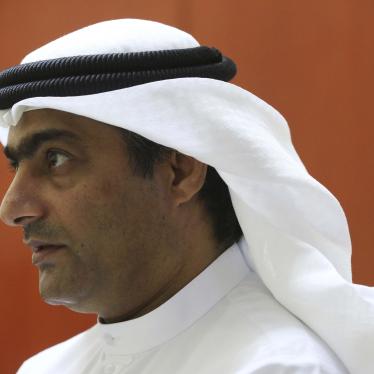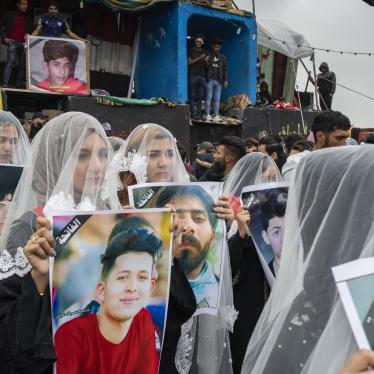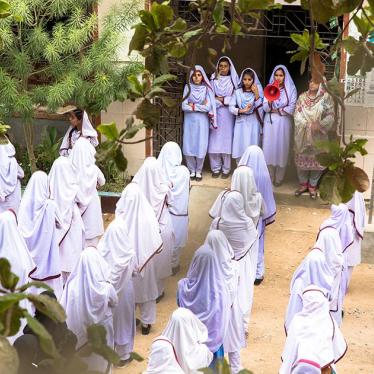(Abu Dhabi) – Authorities have failed to investigate a campaign of death threats, slander and intimidation against five jailed Emirati activists, says an independent report released today. The report, written on behalf of the Gulf Centre for Human Rights (GCHR) with research assistance from Human Rights Watch, documents the threats, including death threats, by government sympathizers and the atmosphere of impunity in which they have been made.
The activists, known among their supporters as the “UAE 5,” were arrested in early April 2011, and are on trial in Abu Dhabi, accused of “publicly insulting” top United Arab Emirates officials. The Federal Supreme Court, which is trying the case, has said it will issue a verdict on November 27. Charlotte Peevers, a British legal expert who is the author of the report, researched it in the UAE during late October and early November with a representative from Human Rights Watch.
“Since their arrests, these peaceful activists have been subjected to an alarming series of threats and intimidation, with the apparent acquiescence of the Emirati authorities,” Peevers said. “By not investigating those who are interfering with justice and threatening people’s lives, UAE authorities are drawing even more attention to the political motivation for this trial.”
The five activists, whose trial opened on June 14, are: Ahmed Mansoor, an engineer and blogger; Nasser bin Ghaith, an economist and university lecturer at Sorbonne Abu Dhabi; and online activists Fahad Salim Dalk, Ahmed Abdul-Khaleq, and Hassan Ali al-Khamis.
The five are charged under article 176 of the penal code, which makes it a crime to publicly insult top officials, for using the banned online political forum UAE Hewar. Because the case is being prosecuted under state security procedures, there is no right of appeal. Human Rights Watch reviewed the messages allegedly posted by the accused, none of which do more than criticize government policy or political leaders. There is no evidence that the men used or incited violence in the course of their political activities.
Peevers said the families of the five men and one of their lawyers have filed more than a dozen specific complaints, each supported with documentary evidence, in some cases including names of those making the threats. The Public Prosecutor and police authorities have systematically ignored the complaints despite their duty to investigate and prosecute suspected criminal offenses.
Peevers said Emirati authorities failed to uphold basic standards of UAE and international law by ignoring what are clearly crimes under domestic law and allowing the campaign to continue unabated.
The United Nations Declaration on Human Rights Defenders provides that countries should “take all necessary measures to ensure the protection of everyone against any violence, threats, retaliation, adverse discrimination, pressure or any other arbitrary action” as a result of their participation in human rights activity.
“These threats not only seek to intimidate the ‘UAE 5,’ but also undermine the judicial process by influencing judicial decision-making,” the report says.
The activists also say they have endured substantial harassment, mistreatment and abuse in prison, as well as upon their initial arrest in April. The circumstances in which the defendants were arrested, denied bail and held in pre-trial detention violate basic rights under the UAE Constitution as well as under international law to which the UAE is a party, GCHR and Human Rights Watch said.
GCHR and Human Rights Watch called on UAE authorities to open an investigation into the threats and hold those responsible accountable. They also urged the UAE to comply with international standards for protecting the rights of those detained and detaining them in conditions that do not cause undue suffering.
An international coalition of rights groups, which includes GCHR and Human Rights Watch, along with Alkarama (Dignity), Amnesty International, the Arabic Network for Human Rights Information (ANHRI), Front Line Defenders and Index on Censorship, has said that the prosecution of the five men violates guarantees of free speech under the UAE’s constitution as well as international human rights law.
Since November 13, the men have been on a hunger strike to protest violations of their basic rights by the judiciary, prosecution, and prison officials, including their prolonged detention on politically motivated charges and a patently unfair trial. They are reported to be in poor health, a defense lawyer told GCHR and Human Rights Watch.
Background
The activists’ fair trial rights have been violated, the coalition of rights groups said. The court did not allow the defendants to review the evidence and charges against them until six months into the trial. The court did not allow defense lawyers to cross-examine one prosecution witness and did not provide sufficient time to cross-examine others. Without explanation, the authorities closed the first four hearings to the public, journalists, international observers, and the families of the accused. On multiple occasions, the court has denied or failed to rule on motions to release the defendants on bail, even though none of the defendants are charged with a violent offense, and authorities have not suggested that they pose a flight risk.
The UAE penal code allows the government to jail people solely for peacefully expressing critical views, in contravention of international human rights guarantees for free speech. Article 176 of the penal code permits a sentence of up to five years in prison for “whoever publicly insults the State President, its flag or national emblem.” Article 8 widens the application of the provision to include the vice president, members of the Supreme Council of the Federation, and others.
Mansoor faces additional charges of inciting others to break the law, calling for an election boycott, and calling for demonstrations. In March, shortly before his arrest, he publicly supported a petition signed by more than 130 people advocating universal, direct elections for the Federal National Council (FNC), a government advisory board, and legislative powers for the council. Before his arrest he gave numerous television and other media interviews on the issue. Mansoor is a member of the Human Rights Watch Middle East advisory committee and of ANHRI’s network.
The International Covenant on Civil and Political Rights (ICCPR) holds that “everyone shall have the right to freedom of expression...to seek, receive and impart information and ideas of all kinds.” While the UAE is not a party to the ICCPR, it reflects authoritative international standards, which allow content-based restrictions only in extremely narrow circumstances, such as cases of slander or libel against private individuals or speech that threatens national security.
Article 32 of the Arab Charter on Human Rights, which the UAE has ratified, guarantees the right to freedom of opinion and expression, and to impart news to others by any means. The only restrictions the charter allows on the practice of this right are those imposed for “respect for the rights of others, their reputation, or the protection of national security, public order, public health, or public morals.” Article 13(2) of the charter also requires judicial hearings to be “public other than [except] in exceptional cases where the interests of justice so require in a democratic society which respects freedom and human rights.”









